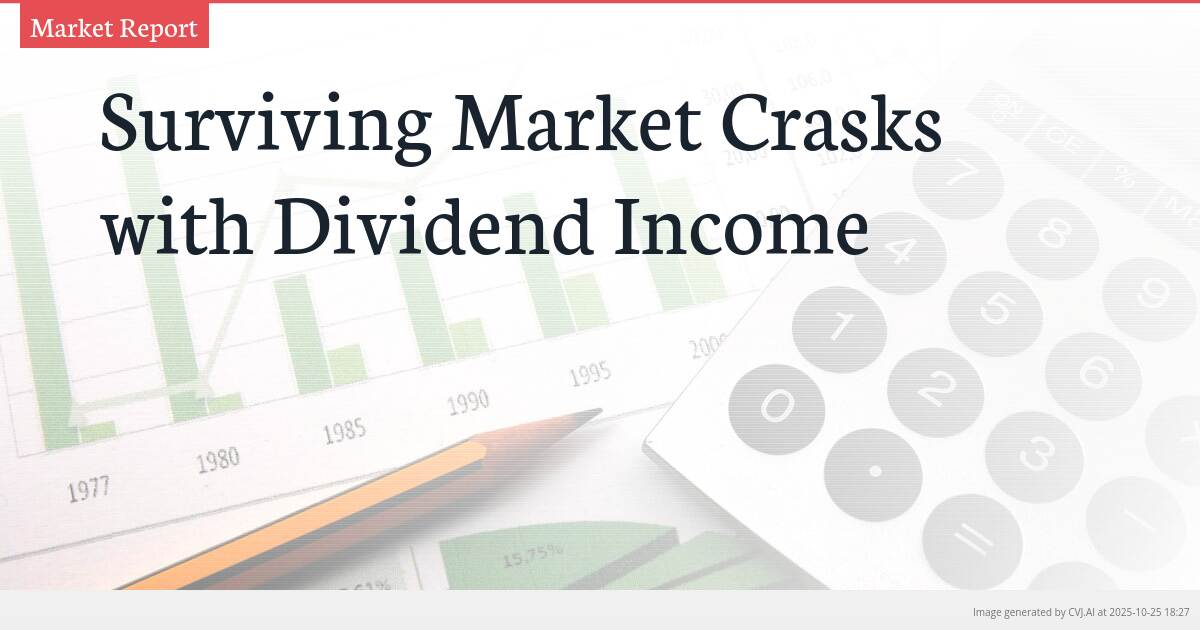This summary text is fully AI-generated and may therefore contain errors or be incomplete.
Introduction
Living off dividends in retirement offers income stability, but market downturns can threaten this strategy. A well-planned dividend approach combined with cash reserves provides crucial protection during volatile periods. Understanding how to navigate these challenges is essential for long-term financial security.
Key Points
- Dividend stocks from companies with strong payment histories often maintain payouts during market downturns, providing income stability
- Maintaining 1-2 years of living expenses in cash reserves is crucial for retirees relying on dividend income during market crashes
- Short-term market slumps may not significantly impact dividend investors if payments remain steady and recoveries occur relatively quickly
The Dividend Strategy for Retirement Income
Living off dividends has become a common retirement strategy for Americans seeking predictable income streams during their golden years. However, this approach requires substantial portfolio accumulation to generate meaningful income. A portfolio yielding 4% would need to reach $500,000 to produce $20,000 annually – an amount that may prove insufficient for comfortable retirement living when combined with Social Security benefits. For more substantial income, a $2 million portfolio at the same 4% yield generates $80,000 per year, providing significantly greater financial flexibility for retirees.
The fundamental challenge emerges when stock market declines coincide with retirement years, potentially undermining what appeared to be a solid dividend strategy. As highlighted in the source discussion, retirees must be prepared for market volatility while maintaining their income-focused approach. The key lies in understanding that dividends can serve as a protective mechanism during downturns, offering continued cash flow even when portfolio values temporarily decline.
Dividends as a Hedge Against Market Volatility
Dividend payments often function as a natural hedge during market slumps, providing income that can offset paper losses in portfolio value. This characteristic makes dividend stocks particularly valuable for retirees who depend on consistent cash flow. The protection mechanism works because companies with strong dividend histories tend to maintain their payouts even during market turbulence, ensuring income continuity for investors.
Selecting the right dividend stocks becomes paramount in building crash-resistant income streams. Companies with established track records of maintaining and increasing dividends through various market cycles are more likely to continue payments during downturns. As one Reddit user accurately noted, ‘Share price can dip all it wants as long as the payout is stable and growing.’ This perspective highlights the core advantage of dividend investing for retirees: the separation of income generation from short-term price fluctuations.
Many stock market crashes prove relatively short-lived, with recoveries often occurring within several months. During these periods, if dividend payments remain steady, retirees may barely notice the market disruption beyond news headlines. This temporary nature of most market declines reinforces the value of maintaining a long-term perspective and avoiding panic-driven decisions that could undermine carefully constructed retirement income strategies.
The Critical Role of Cash Reserves
While dividends provide income stability, relying solely on them during market crashes represents unnecessary risk. Financial experts recommend maintaining one to two years of living expenses in cash reserves as a fundamental protective measure for retirees. This cash cushion, ideally held in high-yield savings accounts or certificate of deposit ladders, ensures that essential expenses can be covered without needing to sell depressed assets during market troughs.
Current interest rate environments make cash reserves particularly attractive, offering respectable returns on emergency funds while maintaining liquidity. Even when rates eventually decline, the strategic importance of maintaining substantial cash reserves remains unchanged. This approach provides psychological comfort and practical flexibility, allowing retirees to navigate market volatility without compromising their long-term investment strategy or dividend income approach.
Professional Guidance for Dividend Investors
Working with a qualified financial advisor provides additional protection for retirees depending on dividend income. These professionals can review portfolio composition to ensure proper diversification across sectors and companies, reducing concentration risk while maintaining income objectives. Financial advisors also help investors avoid emotional decision-making during market stress, preserving long-term strategies that might otherwise be abandoned during temporary downturns.
The vetting process for financial advisors, as mentioned in the source material, ensures that retirees receive guidance from professionals committed to acting in their best interests. This professional oversight becomes particularly valuable when navigating the complexities of market crashes, portfolio rebalancing, and income strategy adjustments. Regular portfolio reviews help confirm that investment mixes remain appropriate for changing circumstances while continuing to generate target income levels.
Ultimately, the combination of selective dividend stock investing, substantial cash reserves, and professional financial guidance creates a robust framework for surviving market crashes while living off investment income. Stock market declines, while unsettling, have historically been followed by recoveries, and maintaining discipline through these cycles proves essential for long-term retirement success. With proper preparation, retirees can continue their dividend strategy confidently, knowing they have multiple layers of protection against market volatility.
📎 Read the original article on 247wallst.com

